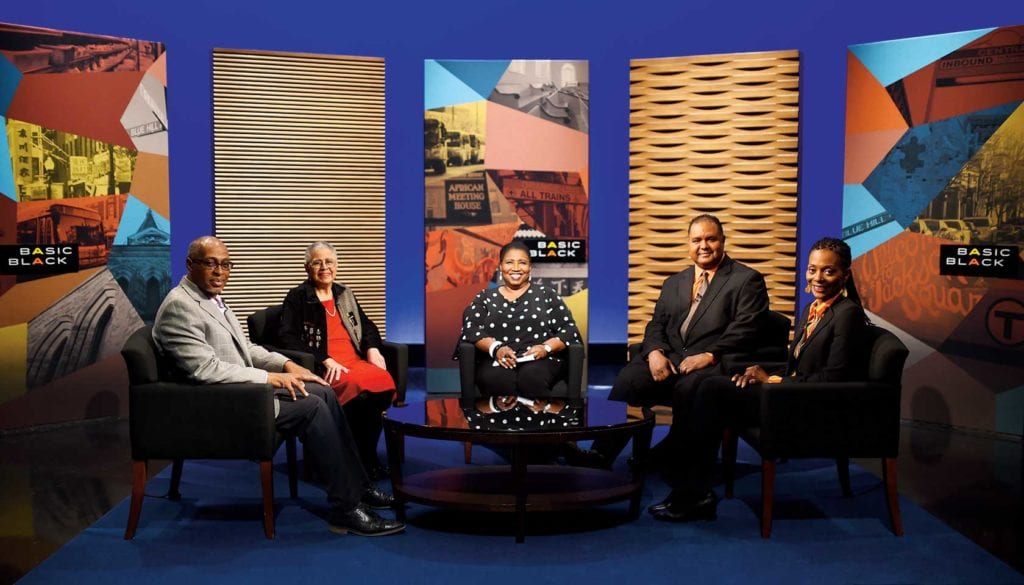50 years of Basic Black: Then and now
Boston’s black journalists share their stories

WGBH’s “Basic Black” hosted a special live taping last Friday at WGBH studios, celebrating 50 years as the longest-running television program highlighting issues affecting people of color in Greater Boston.

Callie Crossley hosts the Basic Black 50th anniversary special live taping episode. photo: Meredith Nierman / WGBH News
The episode featured a panel of the show’s former hosts and regular guests to reflect on the previous five decades of public television journalism, race relations and Boston’s black history.
The discussion was moderated by Callie Crossley, host of “Under the Radar with Callie Crossley.”
“Basic Black,” originally called “Say Brother,” was created in 1968 during the Civil Rights Movement and after the assassination of Dr. Martin Luther King Jr., to fill the demand for a television program reflecting the perspectives of communities of color.
“People say that they like that the show is a frank conversation coming from lived experience and expertise,” said Crossley.
Sarah-Ann Shaw, the first female African American reporter to be televised in Boston and who made her debut appearance on “Say Brother” in 1969 said, “I think it’s important that ‘Say Brother’ did shows that exposed people in the community to different areas … police brutality, education … that they could not get from other sources.”
Shaw said that one of the key stories she worked on was court-ordered school desegregation in Boston. “It was really the story people needed to understand what was going on and why it was important. School education is, then and now, something we should always be looking at,” she said.
Darren Duarte, chief of staff for Brockton Mayor Bill Carpenter and former “Say Brother” host from 1994 to 2004, said one of the most important stories he worked on was a retrospective piece on school busing in 1994.
“That same year, Congress was trying to gut affirmative action. We did a documentary on that, trying to get at the heart of the story,” he said.
Phillip Martin, senior investigative reporter for WGBH news and regular “Basic Black” panelist, recalled the show’s extensive coverage of cases of police brutality, including the 2010 killing of DJ Henry, a Pace University football player from Easton who was shot down by a police officer.
“That conversation allowed us to go into the history [of police brutality]. This show has engaged history in a conversational and important way,” Martin said.
Crossley said the Charles Stuart case of 1989 was “a painful episode with layers of discussion that were peeled on this show.”
The case — still vivid in many Bostonians’ memories — involved Stuart, a white man who told police that a black man shot him and his pregnant wife in a parked car in Mission Hill. This set forth a barrage of policemen stopping and frisking every black man on the street and even pulling black men out of their own homes. In the end, it was revealed that Stuart had been the one to commit the crime.
Key perspectives
The panelists reflected on how cases of black people being profiled and/or killed at the hands of police officers is paralleled today, including current issues of “police being called on black folk for doing ordinary things,” said Crossley, such as sitting at a Starbucks or sleeping in a common room at Yale University.
“You can go back 50 years, you saw white supremacists marching in Virginia. Now, you have them marching in Charlottesville, Virginia,” said Martin. “In some ways, we’re addressing a retrogression on a national level in terms of many policies that we thought had advanced during the Obama administration.”
He continued, “The importance of this show is to continue to point these things out…while others are pointing out Stormy Daniels.”
Kim McLarin, a novelist and former reporter for “Basic Black,” said it was important to have the show as a “designated space where the impact of these events on our communities can be told. A space people can turn to where they know the truth of their lived experience will be given.”
In addition, McLarin said, “Basic Black” invites unknown scholars whom “the community might not normally have access to. They are really vital people, doing important intellectual work,” she said.
Tracking progress
The panelists discussed concrete changes for race relations in Boston that they have observed while living and reporting in the city.
Shaw expressed her dissatisfaction with the recurring problems for communities of color.
“The problem for me, [is] there are so many things that have been repeated and repeated. I want to live long enough to see us do things that have more staying power,” she said.
McLarin said that Boston’s reputation as a city has improved a little, and there are more black professionals willing to live and work here. However, she said, “I’m not sure if issues of housing access or education have improved. The student loan crisis has worsened.”
Martin pointed to the concrete progress of being able to walk into the North End or South Boston as a black person, without getting chased out or running into a racial altercation.
“But there is still that economic segregation,” he said.
With previous guests like Mario Van Peebles, Muhammad Ali, Miriam Makeba and Eartha Kitt, the show covered not only Boston but national and international news as well.
“‘Say Brother’ and ‘Basic Black’ addressed in a probing way the anti-apartheid in South Africa,” said Martin.
As Crossley pointed out, “Basic Black” also features more “fun topics” such as a recent episode on the movie “Black Panther,” but as always, with the lens on race relations and black history.
Crossley described what “Basic Black” has been and will continue to be for Boston. “Out in the field and in the studio, 50 years happening here, with conversations with people who know the story, both lived and with a scholarly perspective.”






